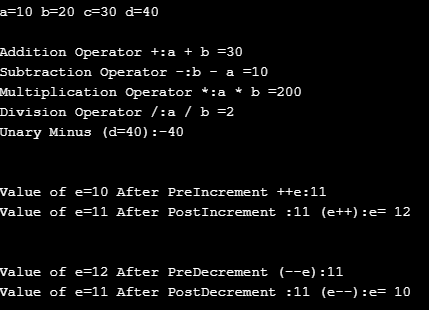Updated March 23, 2023
Introduction to Arithmetic Operators in Java
Java provides a rich operator environment like Arithmetic, Relational, Bitwise, and Logical. Java arithmetic operators are used to perform simple mathematical operations. In Java, we consider Addition, Subtraction, Multiplication and Division operators as Basic Arithmetic operators. For arithmetic operators, operands should of Numeric Type. Java allows to use of arithmetic operations on char type; in java, char is considered a subset of int. Some binary arithmetic operators are also used as unary operators; for example, the subtraction operator is also used for negating the positive value. If anyone of the operand types is double, float, long. The other operand is also converted to double, float, long, respectively.
List of Arithmetic Operators in Java
The following table shows the list of all arithmetic operators in java.
| Operator | Description |
| + | Addition (Also used as Unary Plus). |
| – | Subtraction (Also used as Unary Minus). |
| * | Multiplication |
| / | Division |
| % | Modulus |
| ++ | Increment |
| — | Decrement |
The above-listed operators with their functions and syntax are explained below.
1. Addition Operator “+.”
An addition operator is a Unary operator, i.e. arithmetic operation performed between two operands. Basically, this “+” operator is used to perform a simple arithmetic Addition operation.
- Addition operator + is also used with String type operands to concatenate two separate strings.
- In addition, Operator + is also used as Unary +; it returns the positive value of a variable.
- When it is applied with Numerical Operands, it performs Addition Operation, and when it is applied with String Operands, it performs concatenation operation.
- Java allows us to perform arithmetic Addition operation on char type variables.
Syntax:
"Result=Operand1 + Operand2" or "ResultString=String1 + String2" Or "+Operand"Operan1 & operand2 are numeric types and returns the result of the numeric type. ResultString is a new concatenated string of String1+String2.
2. Subtraction Operator “-”
Subtraction operator “–” performs basic subtraction operation. This operator is a binary operator. This arithmetic operator applied only with numeric operators.
- Subtraction operator can also be used as a unary – operator to negate the numeric value of Operand.
- Java allows us to perform arithmetic Subtraction operation on char type variables since char is considered a subset of int in java.
Syntax:
Result = Operand1 – Operand2 or "- Operand"Operand1 & Operand2 are of any numeric type.
3. Multiplication Operator “*.”
The multiplication operator is also a binary operator. This operator applied only with numerical operands. Multiplication operator performs basic mathematical multiplication operation.
Syntax:
Result = Operand1 * Operand2Operand1 & operand2 are two numeric values of int, long, double or float.
4. Division Operator “/.”
The division operator performs Mathematical division operation. This operator is also a binary operator; in case both operands are of type integer, then the result will be of type integer. If any operand of is of type Float then returns a result is of type float. When dividing any numeric value with 0 Java Exception, Handler throws DivideByZeroException of type ArithmaticException.
Syntax:
result = Operand1 / Operand2;Operand1 & Operand2 are of any numeric values. Operand2 must be any non-zero value.
5. Modulus Operator “%.”
The modulo operator returns the remainder of the two operands. This operator is also a binary operator. Modulo operator can be applied with integer or any other floating-point type variables. If in case trying to perform any floating-point number with modulo zero, throws an ArithmaticException and returns value NaN.
Syntax:
Result = Operand1 % Operand2;Operand1 & Operand2 are any numeric values. Operand2 must be a non-zero numeric value.
6. Increment Operator “++.”
Increment operator “++” increments operand value by 1 at a time. An increment operator is a unary operator, i.e. it applied with only one operand. This operator can be used as Pre Increment or Post Increment.
- Pre Increment: In pre-increment, the value is incremented first; later, it has been used. And the operator is prefixed with the operand.
- Post Increment: In post-increment – the previous value of a variable is used first, and later it has been incremented. The operator is postfixed with the operand.
An increment operator is used with any numerical variables.
7. Decrement Operator “–”
Decrement Operator “–” is a unary operator. This operator decrements operand value by 1 at a time. This operator can be used as Pre Decrement or Post Decrement.
- Pre Decrement: In Pre Decrement -the operator is prefixed with Operand. The first operand value is decrement by 1 later; its value has been used.
- Post Decrement: In Post, Decrement-operator is postfixed with the operand. Here first, the operand previous value is used, and later it has been Decremented. Decrement applied to any numeric variables.
Example to Implement Arithmetic Operators in Java
Below are the examples of arithmetic operators in java.
Code:
public class OperatorDemo1
{
public static void main(String[] args)
{
int a=10;
int b=20;
int c=30;
int d=40;
int e=10;
System.out.println("");
System.out.println("a="+a+" b="+b+" c="+c+" d="+d);
System.out.println("");
System.out.println("Addition Operator +:a + b ="+(a+b));
System.out.println("Subtraction Operator -:b - a ="+(b-a));
System.out.println("Multiplication Operator *:a * b ="+(a*b));
System.out.println("Division Operator /:a / b ="+(b/a));
System.out.println("Unary Minus (d=40):"+(-d));
System.out.println("");
System.out.println("");
//Increment Operator ++
System.out.println("Value of e="+e+" After PreIncrement ++e:"+(++e));
System.out.println("Value of e="+e+" After PostIncrement :"+(e++)+" (e++):e= "+e);
System.out.println("");
//Decrement Operator --
System.out.println("");
System.out.println("Value of e="+e+" After PreDecrement (--e):"+(--e));
System.out.println("Value of e="+e+" After PostDecrement :"+(e--)+" (e--):e= "+e);
}
}Output:
Conclusion
Arithmetic operators perform simple mathematical operations. Since every programming languages use arithmetic operators but compared to other languages, Java provides more flexibility. We can make use of single arithmetic operators for unary plus as well as for string concatenation operation. It even reduces code complexity. Developers can easily understand operation just by observing the type of operands associated with operation.
Recommended Articles
This is a guide to Arithmetic Operators in Java. Here we discuss the list of Arithmetic Operators in Java along with its example and code implementation. You can also go through our suggested articles to learn more –





